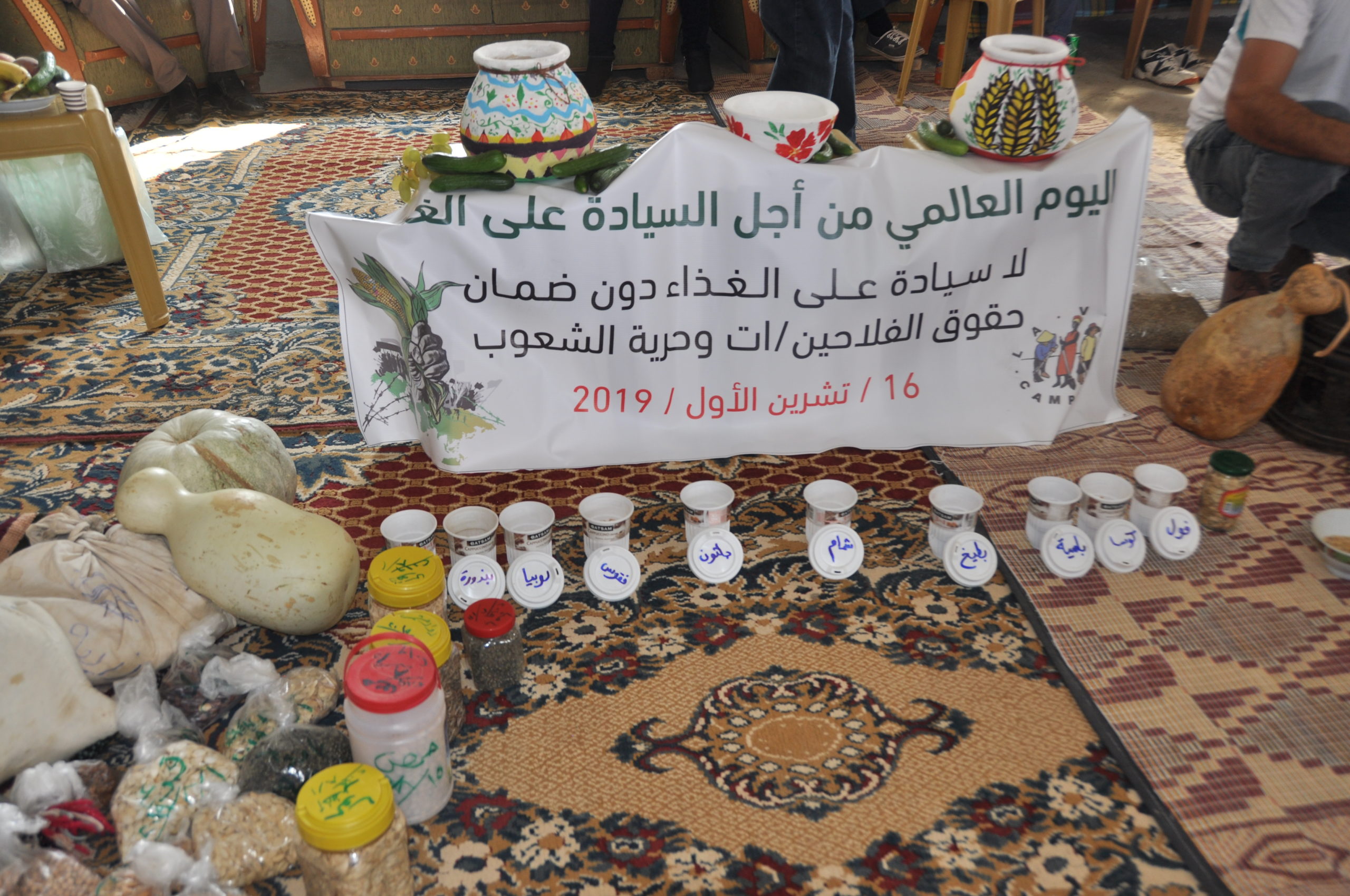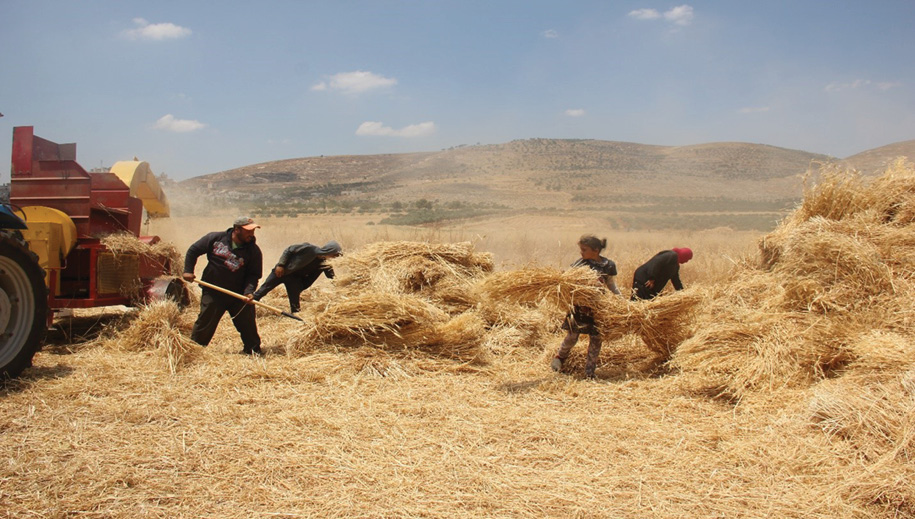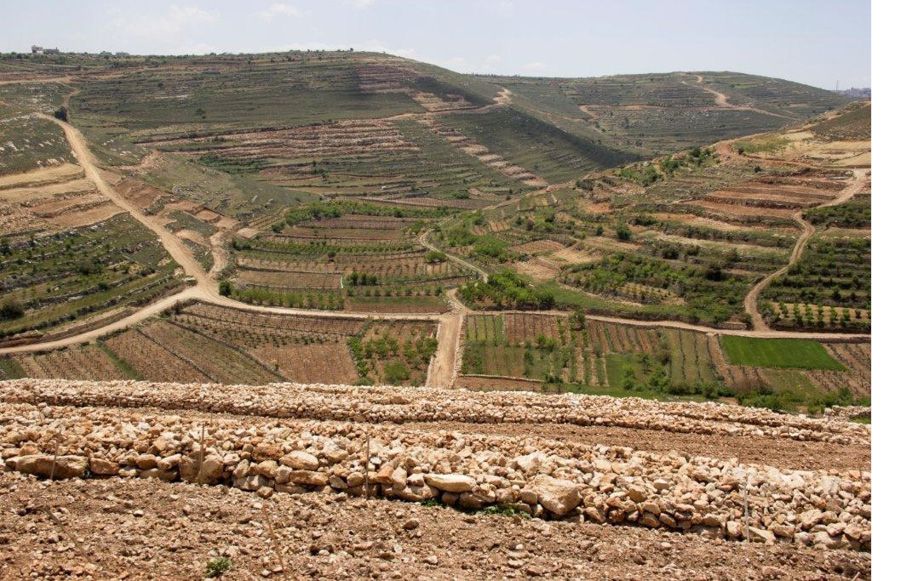Sovereignty over Food Production: A Palestinian Approach towards Developing the Rural Economy

First Published by This Week in Palestine
The plethora of food resources that Palestine could naturally offer is affected by the occupation-imposed control that has resulted in visible and tangible damage to all components of Palestinian traditional food production. Before the 1967 Israeli occupation, Palestinian food production outperformed that of other independent states in the region. Our producers competed with the quality food products of many countries in the world. Our percentage of self-sufficiency in basic crops such as wheat, oranges, apples, and citrus reached nearly 90 percent, exceeding our internal market needs, and we were active exporters to many countries, including Britain and Europe.*1 What led to this self-sufficiency is the production system that depended on the hands of the Palestinian farming families, especially in rural areas, and the adoption of the home economics approach. It is safe to say that Palestinian self-sufficiency proves how strong the agricultural infrastructure was and how producers gave special attention and care to the most valuable resource in bringing people closer to achieving their dream of sovereignty over their decisions in the present and the future.

The occupation has continuously and purposefully brought down any dedicated effort to reinforce this value. The occupation regime has built a comprehensive set of policies and agricultural structures to deprive Palestinians of their source of steadfastness by confiscating fertile lands with high productivity, such as the Jordan Valley, and areas that are rich in natural resources such as water. Israel has imposed its control over more than 85 percent of the Palestinian water resources, knowing that there can be no Palestinian agriculture without water. The Oslo Accords granted Palestinians 1.358 billion m3 of water annually; however, they received less than 87 million m3. Furthermore, the occupation has systematically impeded Palestinian efforts to organize themselves in cooperatives or groups, even those that are voluntary. Strategic efforts to cause collective Palestinian agricultural land abandonment is carried out through the devaluation of land by reinforcing misconceptions that have induced farmers to neglect their lands and become a part of the occupation’s workforce, tempted by high daily wages. Such policies were intensified during the first Intifada, with Israel fully aware that the domestic economy, characterized by home gardens, contributes to Palestinian steadfastness.
Seventy years of ongoing Israeli control over essential Palestinian resources have gradually dispossessed Palestinians of their strength.
The civil disobedience in Beit Sahour during the first Intifada was living proof of the exceptional importance of self-reliance when Palestinian families established hundreds of home gardens and succeeded in securing their food independently. At that time, the Intifada leaders decided to boycott Israeli products, which prompted the occupation forces to impose a harsh siege on the city. However, the city was able to confront the siege and resist because one of its basic needs was fulfilled internally through home gardens!

Unfortunately, Palestinians have been slowly pushed towards becoming an army of workers for Israeli factories and farms, deserting the most important element of strength they need to confront the colonization project. Palestinians were forced onto this path after the full force of the occupation attacked all successful agricultural models that contribute to realizing the optimal investment of resources and help in reaching the threshold of self-sufficiency in many crops and basic commodities. These models were vital economic, political, and social pillars for the Palestinian national cause.
Agricultural production should form the basis of the Palestinian economy until we realize a state of self-sufficiency in many commodities.
During the 1970s, Palestinians cultivated more than 995,000 dunums with field crops, which contributed to self-sufficiency in grain production with a percentage that exceeded 100 percent. Contrast this with the last three years, during which the total area cultivated with grains amounted to less than 200,000 dunums, with a deficiency rate that reached more than 95 percent.
The establishment of the Palestinian Authority in 1993, in line with the Oslo Accords, did not help to place a limit on the dangerous deterioration of all levels of the agricultural sector. Instead, the deterioration and retirement level continued, aggravating the agriculture sector and leading to catastrophic results. In 1970, the agriculture sector contributed around 40 percent to the GDP, 20 percent in 1985, 12 percent in 1994, and below 3.5 percent in 2018.
Yes, the picture seems to be gloomy, obscure, and full of grave challenges. But despite all, the distinguished Palestinian experience in agriculture has not been lost. It is in our blood and can be regained.
Numerous policies add to all the above-mentioned reasons that explain the deterioration of agriculture: closures, control over borders, control over production inputs, and filling the Palestinian market with settlement products. These policies, as well as the absence of clear national protection policies, have led to the dangerous deterioration of one of the most important productive sectors, which is linked to many other economic sectors.
According to the Palestinian Socio-Economic and Food Security Survey 2016–2018, conducted by the Union of Agricultural Work Committees in partnership with the Palestinian Bureau of Statistics, in cooperation with the Food and Agriculture Organization (FAO) and the World Food Program, 47 percent of the population of the Gaza Strip is classified as food insecure, compared to 27 percent of the West Bank population.*2
Likewise, according to data from the Palestinian Central Bureau of Statistics and the Ministry of Social Development, the unemployment rate before the outbreak of COVID-19 reached 29 percent. After the outbreak of the pandemic, the percentage jumped to 40 percent during a period of approximately one month.*3 In other words, around 2 million Palestinians are exposed to food insecurity and no longer have the ability to provide their own food. This is considered one of the most dangerous situations that the Palestinian community has had to endure – a situation that has affected a very large number of families in a short period of time. What is really alarming is that these percentages continue to rise, which means that more Palestinian families will enter the circle of grave danger in the upcoming period!
To rise to the challenge posed by the occupation and the COVID-19 crisis, we must establish a committee that oversees the storing of food products for at least six months.
In light of the threat of the planned annexation, the deterioration in the situation of the Arab countries and the outbreak and impact of COVID-19 has put us in front of our responsibility to rearrange our priorities in a completely different way. Priority should be given to our sovereignty over resources and food. This frankly requires an immediate call for the formation of what can be termed a National Planning Committee for Food Sovereignty. Such a committee is indispensable, especially when we take into consideration that the pandemic will continue, which may threaten the abundance of food and push more families to the brink of poverty and hunger. In response, we have to be well organized. Such a committee would be responsible for providing for and storing food for months or years, as dozens of countries have been doing since the beginning of the pandemic. In other words, there is a need to develop and adopt national strategies of food storage that are able to meet our food needs for a period ranging from six months to a year minimum.
The Palestinian government is required to review its plans and policies, reformulating them in a way that gives “productive” small-scale farmers special attention and protection, admitting their role in the wheel of local production. Likewise, what is required is the development of policies that give priority to production that is based on the needs and demands of the local market. We have to secure our consumers’ needs rather than prioritize the production of crop for external markets. What is required now, in light of all these concerns, including lack of clarity and stability, is to focus on home gardens and prioritize local seeds and local production. Primary attention should be given to the Palestinian local seed banks that are considered the safety vault to preserve and protect the genetic varieties of the local indigenous seeds that have constituted one of the most important food resources for thousands of families, as these seeds have adapted to the environment and climate of Palestine for thousands of years.
Youth must be given a pioneering role in strengthening the agriculture sector through measures such as providing them with the means necessary to facilitate production and involving them in all stages.
There is also a greater importance for young people to undertake a pioneering role in the agricultural production process, given their added value and the enormous energy they can bring. Youth mobilization can be actualized through promoting youth participation in all stages of agricultural production and by allocating the necessary financial resources to provide them with the necessary means of production. More efforts should be invested in encouraging youth to join cooperatives and materialize the idea of creating a Youth Cooperative Village. Such a model is built on granting youth plots of land that are classified as state land or Waqf lands. This would constitute a turning point towards productive agricultural work based on maximizing the role of youth as a reliable energy.
Planning based on an understanding of reality, realistic planning, is the guarantor of providing the elements of agricultural production and growing the food we need by investing in every inch of land available for cultivation or reclamation. Such planning is neither donor-driven nor driven by the desire to meet requirements that qualify us to join international agencies. Our plans should be directed at enabling our small-scale producers – especially youth and women – to produce food adequately without relying on international aid or relief projects. In this way, we will become the ones who make the decisions regarding what to produce, when to produce, and with what means we produce!
By: Fuad Abu Saif
*1 For more information and further details, please refer to the “Agriculture Sector Strategy 2011–13: A Shared Vision,” Palestinian Ministry of Agriculture, 2009, available at https://ershad.moa.pna.ps/uploads/file/Agri_%20Sector%20Strategy/Agri_%20Sector%20Strategy.pdf.
*2 “Conference on the Preliminary Results of the Socio-Economic and Food Security Survey 2018,” Palestinian Central Bureau of Statistics, available at https://fscluster.org/sites/default/files/documents/sefsec_2018_-_survey_preliminary_results.pdf.
-3 Press Release on the Labour Force Survey Results, October to December 2012, Palestinian Central Bureau of Statistics, available at http://www.pcbs.gov.ps/portals/_pcbs/PressRelease/Press_En_LFSQ42012E.pdf.
